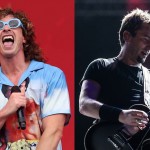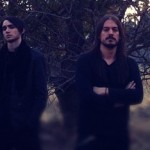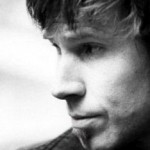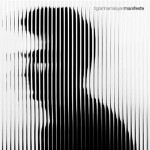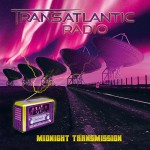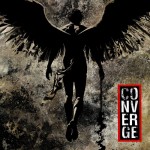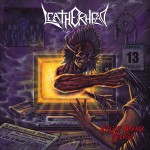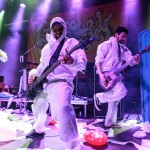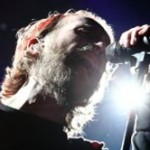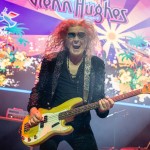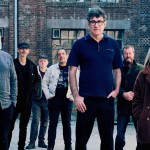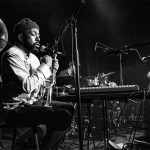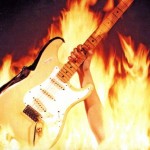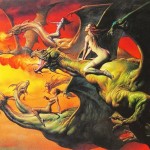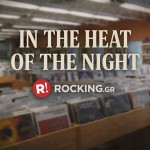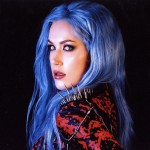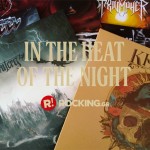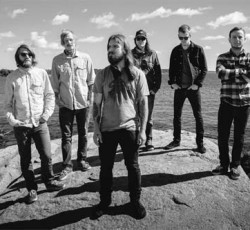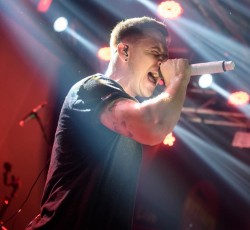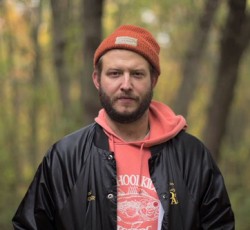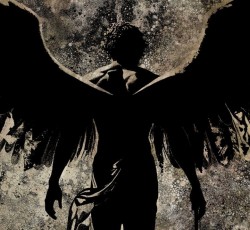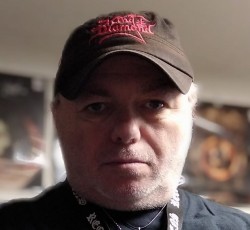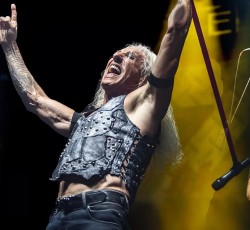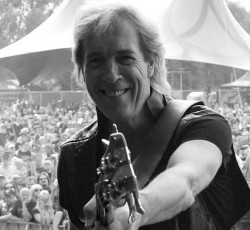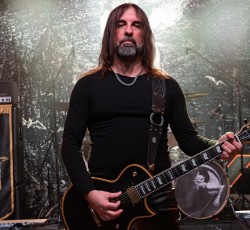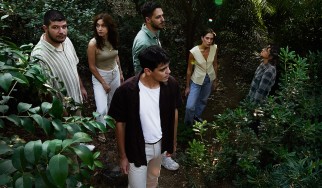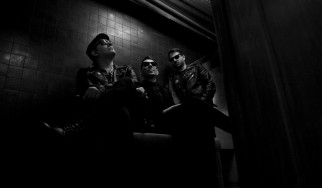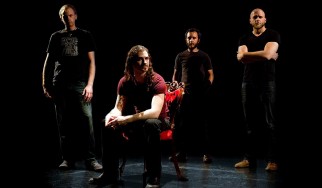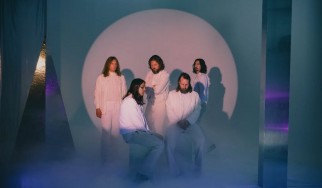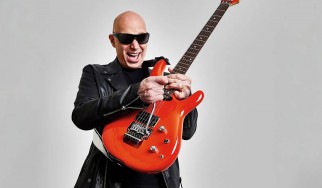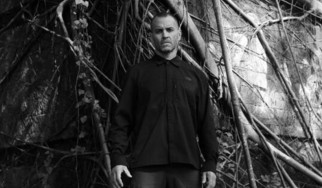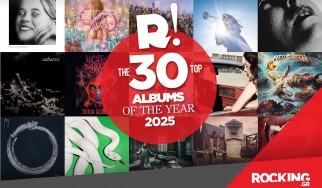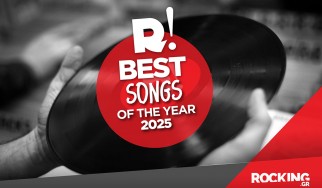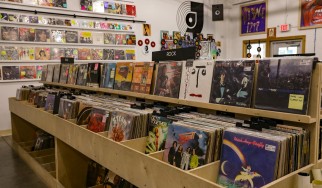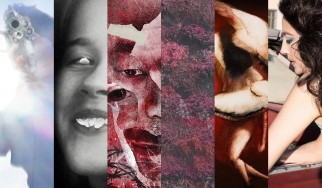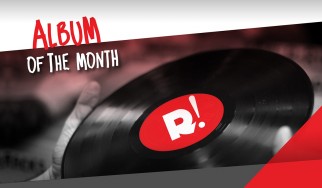Temic: "We 're a friendly Frankestein!"
A conversation about Temic's debut album with Diego Tejeida and Fredrik Klemp
When I first heard that there's a new band formed with Eric Gillette (The Neal Morse Band) on guitars, Diego Tejeida (ex-Haken) on keyboards, Fredrik Klemp (Maraton) on vocals and Simen Sandnes (SHINING, Arkentype) on drums I had a good feeling about it, right from the start. It was not just the fact that I love their works with the bands they've been into, but also the ethos that each one has presented individually as a musician made it look like their union would work really well. And Temic didn't prove me wrong, with their debut album "Terror Management theory" establishing them as the hottest newcomers in the progressive metal scene and proving to be a great start for them.
I had the chance to conduct an interview with Diego and Fredrik and ask them everything I wanted to know about this new endeavor. From the formation of the band and the long process of making this album, to the lyrics and what kind of prog they really are, these two great guys offer all the insights we need to have to dive even deeper into their music.

Hello my friends! I'm really glad to have a chance to have you with me tonight. I'm really excited to have a chance to talk with you because I've followed your musical paths for the last few years, and now you've formed a great new band with a great new album. How are you feeling as we're getting closer to the release date of your debut album with Temic?
Diego: It's definitely a milestone. I mean, it's been a long-long road for us. Even though for the people Temic are kind of new, we started working on this stuff since 2020. So, it's been a long, long process and there's definitely a feel of achieving and culmination of this work we put the last three years, almost four years. So, it's mixed feelings. I'm very excited of course… a little bit. You get that first date butterflies… (laughs) which is kind of cool, you know… We're talking about that with the guys and I think we're all sharing that feeling. We are super excited, and we all are very proud of what we did. And we can't stop thinking about what we want to do when we play live and we're really planning stuff for the next shows. So, this is definitely the first steps to be able to perform live and first the album to be released. How you feel, Fredrik?
Fredrik: I feel the same way man, I'm super excited. I've been anxiously waiting for this for so long, since I met Diego online in 2020, since I heard the first tune, I've just been so excited... I can't wait. Six more days? Five more days? Four more days? It's getting closer…
Diego: It's four days! It's getting closer!
Fredrik: Yeah, I'm so excited.
We knew we didn't want the typical super operatic, kind of power metal voice
I think that's going to be great because the album itself is great, so just wait for good feedback to flow in. But let's take things right from the start. I'll state some facts and you correct me if I'm wrong. This project started between Eric and Diego and then you got Simen coming in for the drums and Simen recommended Fredrik to be the singer. Are all these correct?
Diego: Yes, absolutely! Eric and I, we met before, but the first time we actually shared a tour bus and we toured together was with The Shattered Fortress back in 2017. And Simen was also part of the crew, he was working on that tour as well. I think in the European leg. I don't think he came with us to Australia, but he was in Europe. So yeah, that was the beginning. We knew we gel, and we got off personally and musically and we thought like "oh, we should make a band together sometime or write some music together sometime".
And it was until 2020 that pandemic hit, and it was time to start something new as well for me. And I spoke to Eric. The first person that came to our minds was Simen because he's an amazing drummer. But on top of being an amazing drummer, he's also a guru on all things social media and videos. He's the one doing - for the most part - the production of our music videos. He's a very talented guy and he's the one who recommended Fredrik. More than a recommendation, he was like "demanding" it had to happen. He was like "You guys need to get this. You need to get Fredrik". Eric and I remember listening to Fredrik and we were like "Oh, wow, this is actually really good". Eric and I had an initial conversation of what kind of voice we imagined for the band, and we knew we didn't want the typical kind of super operatic, kind of power metal voice, that's not what we were going for. We were matching something a little bit more modern, with some good falsetto of some sort, pop textures as well. And when we heard Fredrik, I was like "This is exactly it, this is perfect!". So, it was great from Simen, then we met Fredrik and that was that was the beginning of it…
Fredrik: Simen told me the same thing. He was just like "You know you got a new band, right?". I was like "What? What do you mean I got a new band?". "Yeah, you have to come to my rehearsal place. You got a new band! I'm not saying anything more. You just got a new band". I was just like "OK, tell me more". "No, no. Just come to my rehearsal place". And I did kind of a demo thing there and I was like "Yeah. I got a new band. This is awesome." Such great music and such great guys, so it was a no brainer.

When I heard about the lineup - I already knew Eric from The Neal Morse Band and I knew Maraton already, and of course I knew Diego from Haken - it kind of instantly glued to my mind. I think it made sense. Even though I had no idea how you're going to sound together, it somehow made sense musically. Did you feel that too?
Diego: Yeah, I mean, it's kind of like a Frankenstein if you think about it, in the sense of Fredrik and Simen being in Norway and Eric in the US and I'm in Mexico City. But, yeah, like anyone, not only musically, but personally as well, we get along so well. So yes, it makes sense. It's a Frankenstein, but it's a friendly Frankenstein! (laughs). This Frankenstein is nice and it's not trying to kill people. It's actually cool.
Back in the 70s prog was the next step for music. It was people pushing boundaries
Now let's talk about the musical approach and the style of Temic. Even though the term "progressive" means different things to different people nowadays - it's more of a platform than a genre maybe - I feel sure to characterize Temic as a prog band Would we agree with me that you are a progressive metal band, or would you think this term is kind of limiting you?
Diego: As you said, I think prog has very different approaches. And if you look at it from a prog perspective, as the process of prog… if you think about it back in the 70s, the term prog was something that was progressing. It was the next step for music, the introduction of synthesizers for instance. You know, synthesizers for many years were seen as not musical. They were like "Oh, this machine that you just press a button and makes sound. That's no music!". That was what the academics used to say. And then you had people like Wendy Carlos or you got guys like Rick Wright that they came in and started experimenting with those machines and all of the sudden creating music. So back in the day, it was just people pushing boundaries.
I think nowadays there's a small pool of people that think prog is institutionalized, that it is a reference to that era of music. And not necessarily continuing the pushing of the boundaries or continue the pushing of the sound of what music is today. So, in a way, it is freeing calling yourself prog and in the same time it's limiting. Because there's some expectations if you call yourself prog. There's going to be music academics that are going to expect you to shred or to have these crazy time signatures and almost like a flamboyant use of techniques and power techniques to show how much you can do musically.
On the other hand, you have the new bands of modern progressive music that are not really that focused so much on that aspect. They're focused more on the exploration of music and exploration of sound and a little bit more free in the sense of breaking from a set arrangement or a set orchestration or a set time signature. So, I guess without trying to declare, I think yes, we are prog in that sense. We're definitely not prog rock in the sense of that we're trying to show off how much we can play.
The aim is not to show how clever we can be and how many time signatures we can play. The idea is to create good music
This is something Eric and I discussed from the beginning. If there's a need to play something intricate, we can do it. We've been there and we've done it. But it's not the aim. The aim is not to show how clever we can be and how many time signatures we can play. The idea is to create good music and therefore the album is based a lot on the vocal melodies. So, the music is built around it, not the other way around. You know, that happens a lot in prog. The vocal melodies are built around the little space that is left after old instrumentalists have done this stuff. So, I think that will be the dichotomy we'll be doing. But yeah, definitely we're prog. Unless Fredrik says no!
Fredrik: (laughs) That's what I love about the approach of the songwriting of this band. Because it's not a project, it's a band. And, of course, it has the prog elements in it, but it's about nurturing each song for what each song is. And the point of what Diego said, it's not like putting everything and too much information in a song. Because sometimes it's just not needed, the song doesn't need it. That's why I think Diego and Eric are so genius at what they're doing, and that's why the songs speak to me that well. I feel like this is something I could just stand 100% behind and just do it for the rest of my life. It's about the songwriting more than it's about showcasing "Look at my noodle fest. Look at my skillset". Because it's there for sure. Both Diego and Eric and Simen are ridiculous musicians and it's a privilege to play with them. But again, this album is about smart songwriting and I'm so proud to be a part of it.
The most important element of a song is always going to be what are you saying
So, would you say that the difference you make as a band is that you're trying to balance between good songwriting and prog elements in the sense of technical playing? I think I'd agree with that…
Diego: Yeah… In my experience and what I've seen in the prog world oftentimes, the ideas that are simple most of the times are castrated because they're simple, right? It's not prog enough. Sometimes, a lot of prog musicians that come up with a simple idea. And because it's not like a crazy time signature, they end up scrutinizing one and trying to make it overly complex because of the sake of making it complex. And I think that's a thing that happens a lot in the prog world… you're trying to show off your prowess. So, in this case that's not the point. The point is an organic and honest songwriting. If at some point it's needed to add something, that thing is added but in a natural way.
Not to go too far, we were together in July, we were writing new material and we were able to jam out just literally from zero, from scratch an instrumental tune that had some kind of crazy elements. But those elements were honest elements. It's not honest if you're taking the project home and trying to think "How can I look more clever?", but more if it's like "Oh, this is what came out" and "Oh, that's needed in the song". Therefore that's what it is. That's what we actually put in it there. I don't know if that makes sense, but we're trying to keep it honest. And keep in mind that the most important element of a song is always going to be what are you saying, what your song is saying… the lyrics, the message of what you convey. You know, that's the point.

I incorporated electronic elements that for many years I tried to keep at bay, because sometimes electronic music is a dirty word
Yeah, I'll ask about lyrics as well later. Now, with all respect to the other guys that are really great musicians, I think you two are the two main points of difference in this band. Firstly, because the way that you interpret your electronic background in the playing of the keyboards and then at the same time Fredrik's sort of pop sensitivity in his voice and the way that he's not similar to the usual singers - not just in in prog, but in general - these are two points combined together that make Temic music stand out the most. Do you agree with that?
Fredrik: You can answer that, Diego... I agree totally, for sure! I've got the pop influence. When I started off singing, I almost only listened to female singers and I started to learn that kind how to sing a female with a male voice, on the spectrum of my voice. And I started liking metal and stuff like that, so it's just been just combining those kind of two worlds. And I've always kind of felt that that's just me. And I'm never trying to do anything different. So, I'm glad that Diego and Eric and the rest of the guys felt that I would be a good match for Temic. I love singing different things and different styles and genres, but this is where I feel at home. So, the other guys allowing me to feel like home makes it 100% for me.
Diego: No. Yeah. I was just laughing because you said "I agree. I'm awesome". It sounded like this... (laughs)
I think Fredrik was definitely - as I mentioned - something that we envisioned from the very beginning. When I talked to Eric, I was telling him, "Look, I imagine just incorporating these electronic elements" that for many years I kinda tried to keep at bay, because sometimes electronic music is a dirty word again. Again, it's the musicians, because they are under this idea that you press a button and the song makes itself and you compare this to the "real musicians" on Instagram or whatever that play music. So, I do have a long history with electronic music and my own part of more traditionally speaking musical background. I started with classical music, then I started jazz and then went to more modern kind of styles. But, I've always had a big liking for electronic music and to this day that's probably the thing I listen to the most. And the idea on that kind of music is that the vocals are normally very airy, they have a lot of softness to it and they're very emotional, but the way they convey the emotions are different than as I mentioned in a kind of operatic scenario. So, those kind of elements were definitely in my mind when I was doing some stuff.
And, of course, as I mentioned we had Fredrik sending us his demo or kind of trial, and I was just blown away because he has this thing. I worked very closely on the production of the album too. I was on the recording control room when Fredrik was doing stuff and it was such a magical experience to hear him singing and embodying the emotions of the music. It was such a wonderful feeling. So, I'm glad that that kind of translates into the listener and the listener can actually acknowledge that. Because that's something we're very proud of, for sure.
Rich Mouser wanted us to sound like a live band on the album
Yeah! And it kind of makes you - I don't know if it's a correct word - somehow modern or maybe current… Because, some new great bands that make some noise in a good way, have unique and different voices. I am thinking of Dan from Tesseract or Einar from Leprous or even Vessel from Sleep Token. These are guys that bring something new and fresh. I think that Fredrik falls in that category. Because he's in that direction, not because he's close to any of these guys, if you know what I mean. So that gives you a modern twist. At the same time you have your electronic sounds and Eric is playing like John Petrucci - and I mean it in the best possible way, because no one has ever sounded like John Petrucci. So, it's a nice blend that I get from the album.
Diego: Yeah, definitely, there's a lot of contrast! And I think that's a good thing in the sense of my sound goes more towards the synthesizer. As a sound designer, my sound - at least now, at this point in my life - it has that kind of analog EDM, electronic, experimental electronic music sound. Whereas Eric's sound, even his guitar tone, it doesn't sound necessarily like the modern djenty guitars that are very bright. He has his own sound. And I think that combination is extremely good.
The same thing occurred when we were working with Rich Mouser… the way Rich Mouser works, it's a very organic way, his mixes are very crystal clear, you hear everything. He also added an extra set of what was the fresh view to the songs. He highlighted things that initially on the rough mixes were not highlighted and I was like "Oh, that's very interesting". And he was like "Yeah, that sounds amazing, so I need to bring it up". And he has also a way of working that is very organic and not necessarily is the cookie cutter kind of sound that modern producers have, that it's just like big guitars, big drums with a ton of samples and they sound like everything else. I think we have this contrast of modern sounding elements, but also kind of more classic sounding elements, so I guess it's good to have this contrast for sure.
Fredrik: Yeah! Rich wanted us to sound like a live band playing in the same room, as opposed to being in three different countries. Richard, is like a Jedi with the sound… (laughs)

We have a way of doing things our way and Season Of Mist has been super supportive
I'm a big fan of Rich Mouser's work!. He's just great! Now, something I wanted to ask you is how did ended up signing with Season Of Mist? Because it's a label that's more related with extreme metal bands. It's great label, but to be honest I was expecting you to sign to Inside Out or something like that. So how did you end up with Season of Mist? And how has this worked so far?
Diego: Well, that's mostly to do with our management. When Rob, our manager, came up with the option I was slightly worried because of that fact. I was like, "Oh, but they're mostly doing like kind of black metal". And he was like "No, no! Michael Berberian, the boss of the label is really into prog". He has some prog bands now, like Voyager from Australia in the label. He has Cynic which is a very experimental prog band and they have new bands as well. A couple weeks ago they signed someone else... It's such a big label that is very difficult to keep track.
And also, we have a way of doing things our way and they've been super supportive. So, it was kind of that situation that we would sit down and be like "Is this right? Because, they mostly seem to have like super heavy metal bands". But it's quite the opposite. It seems to be the new path they're opening as well.
They've been very, very good to us. They support our music a lot, which is very nice to hear, right? You don't know always get this. You don't always get an e-mail from the label boss telling you "Hey, I love your album. It's sounding really good. Let's push it. Let's try it". So yeah, so far, we have absolutely no misgivings about it.
Fredrik: Totally agree. It's amazing.
The idea of the album is a reminder to ourselves that we're all going to perish at some point. And by reminding ourselves that rather than blocking it, we can actually fully live
Now, why is the album called "Terror Management Theory"? Is there a basic idea or a common theme running through the lyrics? And who's responsible for the lyrics and the themes you talk about? I' d like to know more about it.
Diego: Do you want to go Fredrik?
Fredrik: It's been a combination. When we started off - because it's been a long process since 2020 the entire making of the album - me and Diego were sending over stuff and ideas. Diego has been singing a lot for me, sending me over demos, making melody lines. He's an amazing songwriter, both as a sound designer and a keyboard player, but also as a songwriter lyrically. So, we've been pitching forth and back ideas and I've been jumping on the big hooks for choruses. And we were just sending forth and back ideas and having always in the back of our head what was best for the song. Lyrically, the writing for the album has been mostly Diego and Eric and Diego's wife Katie writing all the stuff. I've been writing my part as well, so pitching forth and back ideas. You can elaborate more if you want Diego…
Diego: Yeah. So, you were asking about the album title… So, the album title "Terror Management Theory", that is an actual social psychology theory that outlines and proposes how we as humans deal with the terror that causes thinking about our own mortality. It's a very interesting story and there are a lot of people who are interested into it and like to read about. But basically, it's about the different ways that we humans we deal with it. Normally our default modus operandi is to not think about it. Because that crosses some sort of like a terrorist… that's why it's called terror management. So, how we manage that terror that presents to us?
But it was not intentional. And as Fredrik said, we did the bigger chunk of the lyric writing here. And it was not necessarily something that was intentional at first. I mean, the way I write lyrics normally is almost a free association. Again, going back to psychology terms… I normally start with a melody and the melody has kind of a vowel sound in my head. I imagine it and I'm like "OK, that sounds good". And I start writing stuff that I think makes sense and all of a sudden I realize "Oh I'm writing about this". You don't realize it until you're writing it and then you start shaping it up. Like the song reveals itself. Of course, this album was written in the beginning of the pandemic when there was a lot of anxiety, there was a lot of fear flowing around. I had people that were close to me and my age, who passed away because of COVID. Right now, everything is relatively under control, but it was pretty scary. Not to mention not knowing how long it was going to be. So, we were facing this thing.
A lot of the songs are from an existential point of view, but in a positive way. The lyrics or maybe the idea of the album is a reminder for ourselves that everything will end. That we're all going to perish at some point. And by reminding ourselves that rather than blocking it, we can actually fully live. We can actually appreciate every second and see that every moment is precious. And we can actually push through. A song like "Mothallah" tries to unify us as species and as individuals. We all go through challenges, and at the end of the day we all have to push through, because that's what we do. If you're alive, you have to push through. There's no another way, even though eventually you will live no longer at some point.
The theory was brought by my wife. She's an editor and she was like "Hey, have you heard about this theory? I think this encapsulates very well the lyrics on the album!". And I was like "Oh, yeah, this is actually perfect". So, she helped out, as Fredrik mentioned as well. She helped with one song lyrics as well. And she was proofreading the songs. Writing the lyrics was a very long process, trying to get everything in one place. But, at the end of the day, we realized there was this underlying theme that was happening without necessarily initially intending it. It's just a thing that happened. And that was the cherry on the cake.
We knew "Falling Away" would be a single from the very beginning
Let's get a bit to the songs of the album. First of all, it's a very cohesive album and a very good album from beginning to end, so I'd find it very difficult to pick up a single or some standout tracks. So how did it work for you picking "Count Your Losses", "Falling Away" and "Mothallah" as the three singles to preview the album to the world? And which different side of Temic does each song represent?
Diego: Being very honest, I don't think "Count Your Losses" initially was contemplated as a single. I think that was the label and the management, they were really pushing for that song. They were like "I think this is a really good song and it shows like a different side and it has some really good element in it". It's funny because as the creators, you have an initial idea of what you think is your favorite, and one thing is going to be the one. And then all of a sudden you realize in the reviews that people like the one that you thought like "Oh, OK, fine". It's very interesting. There's a different experience for everyone.
We knew "Falling Away" would be a single from the very beginning… Since like Fredrik and I started working on the demos for that. Fredrik came up with that chorus melody and I was like "Yes! This is what we need. This is amazing. This is a great". I was so excited with that tune.
And "Mothallah" was a tune that the idea of being a single came once we finished it. When we finished the tune we thought "oh this tune is so good, it has to be a single". Just being open, as I said, we initially had other ideas of what songs should be put out, but when you realize "OK, this is actually a very strong song… and this one maybe… I don't know, maybe this is one is better for the single"… But "Count Your Losses" was definitely a suggestion by our management and the label.
Fredrik: I feel it shows all the true colors of the band. Just like as Diego stated, it's really been a long process and when we finished the album, we all had thoughts about what singles to pick, but in the end I'm so happy with the choices that we had. "Count Your Losses" is a great song and shows kind of more of the heavy side of us, "Falling Away" It's more about singing the chorus and ‘Mothallah"… what a mammoth of a song. It's amazing. So, I'm really happy with these...

If I had to pick a couple of favorites it would be "Mothallah", "Skeletons" and "Acts Of Violence, even though there's no weak song on the album as I said before. So, what about these two songs? I'd like to know your take on these songs, how they came together and what they mean to you…
Diego: Actually, "Skeletons" was the second tune, the second demo I started working on. For the writing process I had an initial demo that I sent to Eric. That was even before Fredrik was involved. So, Eric would do his thing, he sent it back after he chopped it and whatever. That was the second tune and the initial tune was meant to have some kind of synthwave vibes. For people who are outside of the synthesizer world, synthwave is kind of this new wave of music that has this very strong 80s neon vibe, right? So, that was the initial idea. And funny enough, at some point, I mentioned to the guys "Hey, what if we need to maybe put a song aside? Maybe we can put "Skeletons" for next release? I don't know…" And they were like "No! What you're talking about? It has to be on the album". And it's funny because this is one of the situations that I was just saying about what different people think… This one seems to be strong among the prog fans, they like it the most. So that's very interesting…
[I raise my hand as a prog fan]
Diego: …Exactly! (laughs)
You were asking about "Acts Of Violence" as well. I absolutely love that tune! And it has a very funny story, because that tune, the initial groove for the whole tune - for all the geeks - I think it's in 15/16 or 15/18… I don't know…. something with 15… Anyway, the whole tune is in one time zone, which is kind of unusual. I just started writing that song even before the pandemic. It was just a jam on my drum machine and a synthesizer, and I was thinking "this is an interesting groove". I wasn't writing something on 15, but that's the way it came out naturally. Again, I wasn't trying to be clever. So, I just left it on my hard drive. Then when I started working for this record I thought, well, maybe I can use this thing. The initially the demo I sent to Fredrik, it had the vocal melodies, but the vocal melodies didn't have lyrics. At that point, I didn't even write any provision lyrics. It was just me saying "Doo Doo Doo". So, the whole. Song it was me "Doo Doo Doo Doo" [editor: Diego sings the melody with doo-doo]. The whole song was like that. That's why the working title was "The Magic Doodoo". (laughs)
It's a very funny name, but I was kind of getting closer to the deadline for the studio and I was kind of finishing the lyrics because, we had like two weeks…. Sorry, no… a couple of months before I flew to Norway and then we went to Sweden to record vocals. Then my wife said "Hey, this song inspired me, so I started writing some lyrics, if that's OK with you". I was like "Yeah, this is perfect". So, she showed me the lyrics and I was absolutely blown away with what she was writing, because it fit right in the theme. And we had this back and forth a little bit, but those lyrics are mostly written by Katie, my wife. I really love having her on the album…
Fredrik: She's such a talent.
Diego: That was kind of the story. It's a funny story of the "The Magic Doodoo"
I'd also like to ask you about "Friendly Fire". I'm an old prong fan and I really love that song, even though it's instrumental and it doesn't have Fredrik on it…
Fredrik: Well, I love it too…
At least, it will give you a breather on the live sets…
Fredrik: For sure! I absolutely love it! Like, I love that song so much! When I drive to work in the morning "Friendly Fire" gives me the energy that I need…
I have to admit I'm mostly drawn away from instrumental tracks lately. It has to be really good to get me. And this one got me really well. I think it's one of my favorites on the album. It's a great tune, but I was thinking that you didn't want to be that prog band, but then you have an Instrumental track like that. So how did this work out?
Diego: I mean… yes and no. This is a thing Eric and talked about. We were like "You know what? It would be nice to have a prog tune, like an instrumental tune. A prog instrumental tune". The idea, as well though, it's not to again make something just like "Oh, I can play all these time signatures!". If you listen to the tune, it has a melody, it has a focal point. So, instead of focusing… like the other tunes have focused on the voice and the vocal melody, this tune is focused on the actual melody, whether it is the synths playing the melody or the guitar playing. But it's focused around the theme, almost like a jazz standard, right? If you listen to a jazz tune and it's played, you recognize the melody and you improvise over certain elements and you come back. But as a listener, you can recognize "Oh, that's "Autumn Leaves" or "oh, that is one "In Rome"". You're able to recognize that. So, the tune itself is built around a melody and when you're writing these instrumental tunes you're writing almost as a roller coaster.
You have your melody where it comes as your point of reference as a listener, but also "OK, so where I want the energy to go?", so the tune in the middle is very intense. It has kind these headbanging moments and that was the core of it. And then it goes back and ends up on very melodic note, if you want. So again, it was all about the melodic aspect of the song. Of course, as an instrumental you will bring a little bit more of your chops, a little bit more things to flourish, because you need to keep the ear interested, both as a musician and also as a listener. It's nice to hear all these ornaments and hear all this stuff happening, but there's definitely a narrative. So, the ethos didn't get broken of the rest of the album with this tune. It's an instrumental tune and you expect things like this, but if you listen to it, there's a melody as opposed to just raves put together just to show that you can play a ton.

Next question is about live sets. I've seen you. You've already announced one festival set, if I'm not wrong… that's what I've seen so far. So, are you preparing for maybe a whole tour to support the album? Do you have plans for playing live and stuff? Is there anything in in the plans?
Fredrik: It's definitely in the works. Yeah, for sure. We're talking with the management. Yeah, it's definitely in the works that we're gonna play this album a lot live. But, we can't say too much, but we're working on it?
Since you're a prog band what special do you plan for your live shows?
Diego: What special things we're planning for the show?
"Giving the audience something new every night is something to take home
Yeah, if you plan anything special…
Diego: Yeah, for sure. I mean, first of all is the ethos of what we want to do. And I think one of the major advantages of playing with people like Eric or Simen - in terms of instrumentalist - is that those guys are risk takers. You get the two types of musicians: the musician that needs to take everything home and practice it until they feel like "oh, I can do it now". But when you ask them to do something on the spot they freak out. Because they don't have the time to actually take it home, work it out, and then make it look like they always play it that way. Whereas, people like Simen and Fredrik, you ask them to play anything and they're like "OK, alright!". I think that's something that we want to take advantage of for sure, like exploit that… Because not many bands have that. You know, you have a lot of the academics that pre-rehearse everything and everything is kind of choreographed. And it has obviously its perks to do it that way, but I feel like giving the audience something new every night is also something to take home. And that's something that I learned when I was playing with Devin Townsend as well. The tours I did with him, every night was different. There were parts of the set that it was completely improvised. It was just Morgan playing drums, Devin playing something on top and I was on the spot creating sounds and sound effects and all that kind of stuff. Which also as a musician keeps you on your toes, but also the audience what they see in is completely unique. What they're seeing only happened that night and that was it. And I think there's a magic to that. But not every musician can do that. So that's something we definitely want to exploit.
A live show is all about creating a moment together with the audience
Noone does it anymore. They all want the preset kind of stuff that's all clicked and in place. That's OK, that's part of the show, but I like the improvisation and not knowing what to expect from a show. That's the special thing I've been asking about knowing you as musicians and your prog side. Would you consider filling the set with any covers maybe or songs from current or previous bands that you played on and mix things ups like that?
Diego: We already have to actually cut some songs from the album. But that's probably because of the extra stuff we want to add… but we don't want to spoil the surprise. Of course, as a fan and as an audience member as well, I don't wanna know the setlist. I just want to go and see and experience it like "Oh, they play this song". It's a lot more fun doing it like that…
Fredrik: So true… and another things that I love about Diego and Simen and Eric too, is the energy they have. Cause I've been to so many concerts, so many metal concerts, and there's no energy, there's no communication. And the one thing I felt a connection with Diego right away is that when he plays live, he has this energy. And Simen has this energy. There's a communication with the audience. "You're here to enjoy the show with us". We're not playing just like "Look at me!". It's like we want to communicate something and that energy is so important for me, especially as a vocalist. And I feel Diego shares the same type of energy, Simen too and Eric too. It's about creating a moment together with the audience, not necessarily for the audience always. Let's create the magic together here! That's really important for me.
And I've witnessed that you have that kind of energy, because I've seen you playing live with Maraton and that's the kind of performer you're on stage, as far as I can tell. So, that fits with other guys as well. Now just before we close, it's that time of year, so I'm going to just ask about your favorite albums of 2023...
Diego: It's a difficult one. I could just tell you from the top of my head… I don't really listen to new music, because I'm I've been so busy right now doing this in my studio all day. So, when I am done, I probably need some silence, because of the ear fatigue. So, with that in mind, an album that I've been listening to a lot recently is by this band called Hammock and the name of the album is "Love In The Void. That album came out in March this year and I just started listening like a month ago or two months ago, and it's wonderful. Of course, it's not metal and it's not progressive. For people who are not familiar with Hammock, that is kind of post-rock with beautiful soundscapes. It's so great. When I finish doing my work in the studio, and maybe sending some emails, I put that album to wrap things up, get my brain in this nice soft moment. That album for me has been super-super viable. Apart from that, I cannot give you any other ones, but that one, Hammock's "Love In The Void", I've been loving this album for sure.
Fredrik: I'm a sucker for Tesseract and "War Of Being" is such a good album. I'm in the same position as Diego. That's busy times, and when I'm done with my day I don't really listen to music. I listen to music when I'm in my car. This year I'll have to go with Tesseract and also Sleep Token. I love those guys as well. I think they're amazing. So, those two albums, for sure. Yeah, those two…
Well, I'll surely have "Terror Management Theory" in my list, I have to say...
Diego: That's perfect! That's super good to hear. Thank you!

